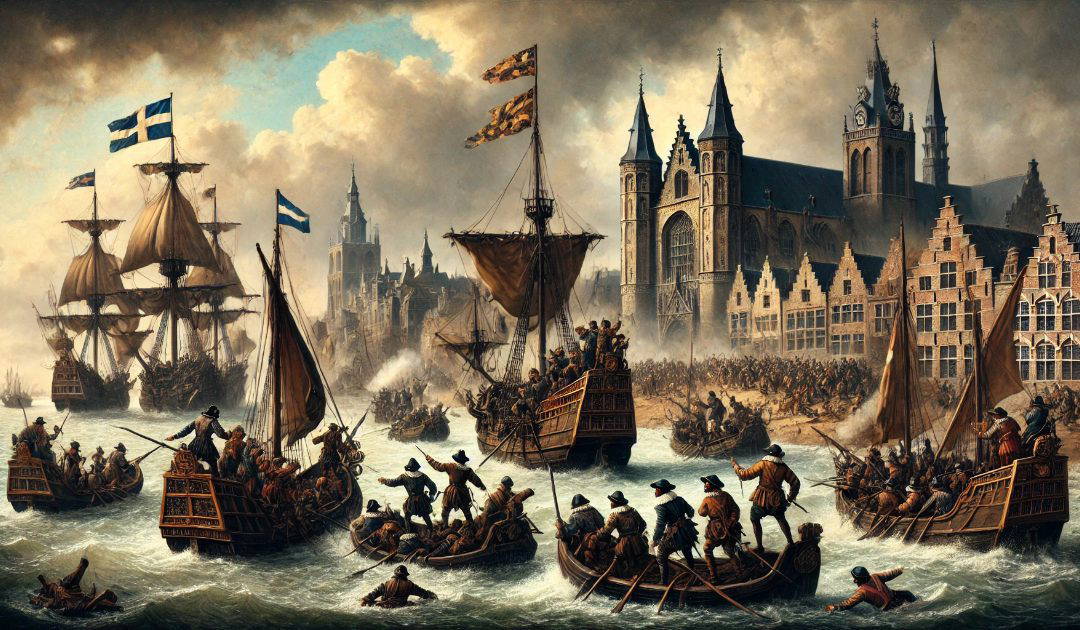On the 1st of April 1572 the Sea Beggars, or Waterguezen, captured Brielle. In my account of the life of my ancestor, the Elizabethan spy, Sir Anthony Standen, he serves with the Sea Beggars for a few months. The book is called The Spy who Sank the Armada, the first book in the Sir Anthony Standen Adventures. But let’s get back to the Sea Beggars.
The year 1572 marked a significant turning point in the Eighty Years’ War, a prolonged and tumultuous struggle for independence by the Dutch provinces against Spanish rule. Among the pivotal events of this period was the capture of Brielle by the Sea Beggars, a seemingly small event that would have vast repercussions for the future of the Netherlands.
The Eighty Years’ War began in 1568, rooted in widespread dissatisfaction with the rule of King Philip II of Spain. The imposition of heavy taxes, religious persecution, and centralised political control fuelled resentment among the Dutch population. The Sea Beggars, a group of rebel privateers, emerged as a symbol of defiance against Spanish oppression. Operating from the waters of the North Sea, these sea-faring rebels conducted raids and disrupted Spanish shipping, gradually gaining a reputation for their audacity and resilience.
Contrary to the image of organised military forces, the Sea Beggars were a diverse and motley crew, comprising noblemen, exiled Calvinists, and outlaws. Their leader, William of Orange, sought to harness their rebellious spirit to challenge Spanish authority. Yet, their activities were often marked by opportunism rather than strategic coordination.
By the early months of 1572, the Sea Beggars found themselves in a precarious position. Expelled from their base in England due to diplomatic pressures, they roamed the North Sea, searching for a new haven. It was a combination of desperation and happenstance that led them to the town of Brielle, located on the island of Voorne in South Holland.
On the morning of 1st of April, 1572, the Sea Beggars approached Brielle, unaware of the significant role this small town would play in the greater conflict. The Spanish garrison had recently departed Brielle to combat other uprisings in the region, leaving the town almost defenceless. Recognising an opportunity, the Sea Beggars made their move.
The capture of Brielle was swift and efficient. Upon arrival, the Sea Beggars capitalised on the town’s lack of defences, quickly overwhelming the minimal resistance. Legend has it that the success was due in part to a local boy, who pointed out a weak spot in the town’s fortifications.
While the capture of Brielle might have seemed insignificant at the time, it sent shockwaves throughout the region. The news spread rapidly, igniting hope among the Dutch provinces that rebellion against Spanish rule was not only possible but achievable.
Importantly, the capture provided a tangible symbol for William of Orange and his supporters, galvanising the revolt. The town’s fall inspired other cities in the Low Countries to rise up against their Spanish oppressors, creating a domino effect that would shape the course of the Eighty Years’ War.
The Sea Beggars, who had previously been seen as mere outcasts and pirates, were suddenly hailed as heroes. Their unexpected success at Brielle gave them renewed purpose and legitimacy. More towns and cities began opening their gates to the rebels, and the movement for Dutch independence gained unstoppable momentum.
The capture of Brielle marked the beginning of a series of events that would ultimately lead to the recognition of Dutch independence. Though the war would continue for many more decades, the events of 1st of April, 1572, are credited with inspiring a sense of national identity and unity among the Dutch people.
In many ways, the capture of Brielle serves as a metaphor for the unexpected turns that can alter the course of history. A small town on a seemingly ordinary day became the site of a decisive and transformative event, proving that even the most unlikely circumstances can ignite change.
Today, the city’s capture is commemorated annually in Brielle, reminding the Netherlands and the world of the enduring spirit of resistance and the power of hope and unity in the face of adversity. The Sea Beggars’ capture of Brielle remains a testament to the steadfast pursuit of freedom and self-determination, shaping the identity of a nation.

